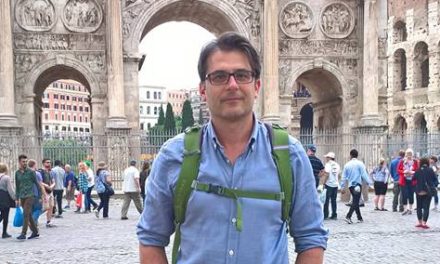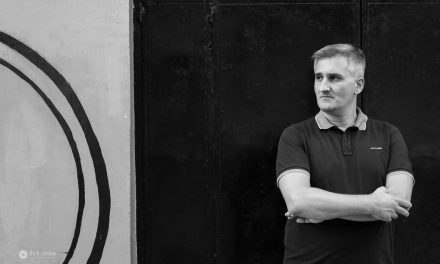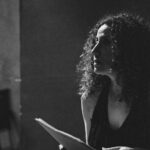Spiros Chairetis was born in Athens in 1988. He serves as a postdoctoral researcher in the Department of Communication, Media, and Culture at Panteion University and currently holds the position of Visiting Researcher at the University of Amsterdam and the Research Centre for the Humanities (RCH). His research explores the relationship between media and their audiences through genre, feminist, and queer perspectives. Some of his poems and short stories have been featured in the first queer poetic anthology, the feminist zine Mov Medouses, and online poetry magazines. The Merman and Other Creatures is his debut poetry collection (Thraca, 2023).
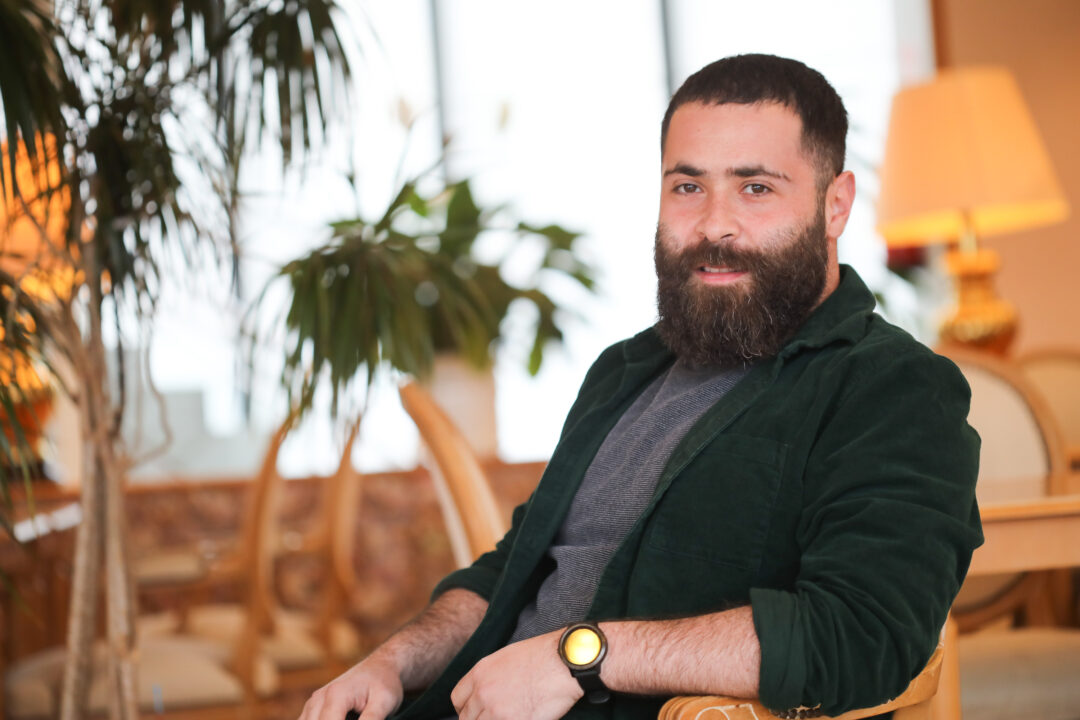
Your first writing venture The Merman and Other Creatures (Thraca, 2023) received quite favorable reviews upon publication. Tell us a few things about the book.
In the first pages of this book, you will find two quotes from Jack Halberstam’s monograph, The Queer Art of Failure. This is because I see this collection as an elegy on failure in many ways. Most of the poems included were written many years ago, and although I made some attempts to publish them in literary magazines, I had no luck. Yet, failure is a recurring theme permeating the book, illustrating what it means to fail in societal institutions that prioritize certain ways of being—from the expectations and hauntings of performing successful sonhood, the role of a good soldier for the nation, and a proper partner, to tensions within rigid notions of love and understandings of queerness, even within the queer community.
In 2022, I noticed that Thraca had an annual competition for the best debut poetry collection. I submitted my work, which was then called When Jack Halberstam Left the Building. Unsurprisingly, I didn’t win with such a pretentious and niche title (laughs). However, this “setback” provided an opportunity to revisit the poems, modify them, and find a title that better reflects what I wanted to share.
The hybrid symbol of the merman/mermaid and its state of in-betweenness has been theorized over the years as a metaphor for coming out or an allegory for the trans experience. This interpretation is common among critics like Androniki Tasioula, who did me the honor of writing a generous review , and among those who discuss the book with me. And fairly so. But that is not exactly what I had in mind, or at least, not the entire story. Mermaids and mermen have been my companions since I was young. I was obsessed with them and used to draw them all the time. Of course, the creatures I created as a child conformed to Western beauty standards and the ideals of thinness with which we are all familiar. This project is thus an attempt to rewrite the imagery and understandings of childhood with vocabularies from the present. It is an act of undoing the past, which was given to some of us in the late 80s and 90s, at a time when we did not have the knowledge or agency to respond otherwise, and an act of redoing it on our own terms.
The book touches upon a queer thematology, bringing to the spotlight “the contradictions of both heteronormality and homonormality by focusing on the dominant discourse,” while it “comments on the effects of gendered performances on our bodies,” in the words of researcher Haris Otabasis. Does poetry constitute for you a way to increase visibility and raise awareness about LGBTQI+ issues?
Bodies never entirely belong to their owners, and this acknowledgment is quite sad, considering all the mechanisms in place to monitor and direct us. Similarly, books do not belong exclusively to their creators, and that’s the beautiful part. Writing about what has traditionally been at the margins has the potential to create small cracks through which people can glimpse possibilities. That is the optimistic scenario; the real question is who is allowed to write poetry (meaning who has access to publishing houses and can cover the costs often associated with production), who reads this kind of poetry which raises LGBTQI+ issues, how accessible this poetry is to a broad readership, and whether educational settings such as schools and universities incentivize students to explore it. On my pessimistic days, I feel that we are a small bubble—those who read this poetry. Yet sometimes I hear about Black, feminist, and queer poetic voices entering classrooms through bottom-up approaches by teachers and professors who go beyond their “official” syllabus, and I feel hopeful. Increasing visibility and raising awareness about LGBTQI+ issues imply impact, which in the humanities is not easily tangible. So, my answer is that books can incite change when certain conditions are right, but you can’t predict exactly when societal shifts will manifest.
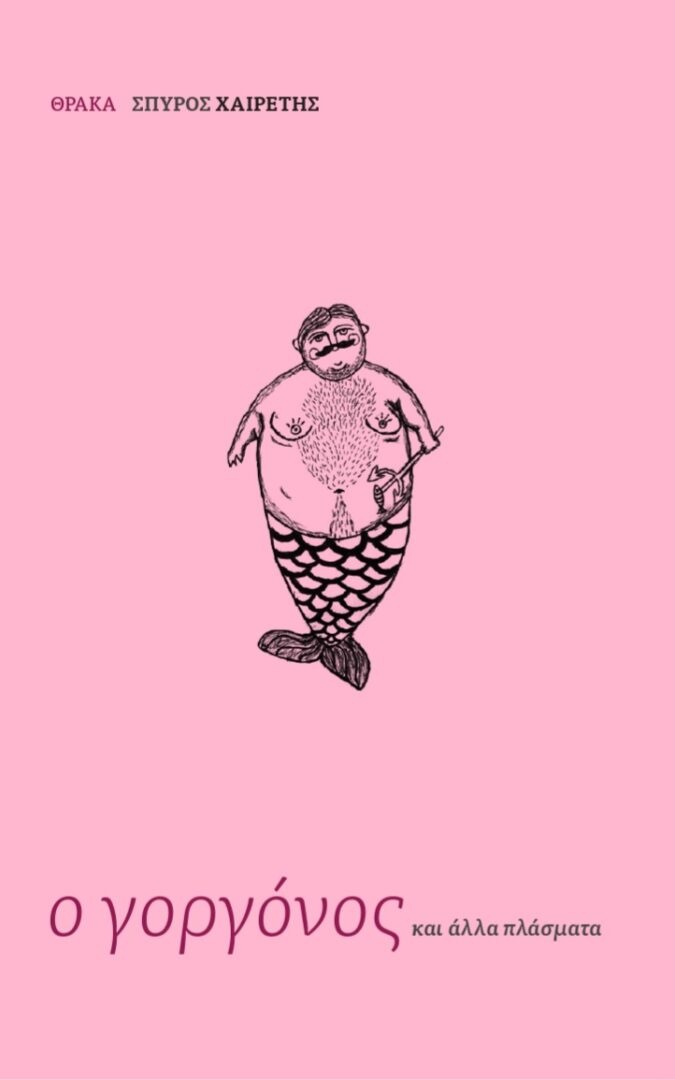
More generally, what about the political aspects of gender and their revolutionary potential in literature?
That’s a tough one. When discussing revolutionary potential, we enter murky waters since each of us has our own definition, which may change over time and vary among individuals. For instance, Greek queer literary works from the past, considered revolutionary then, might have employed themes and forms already common in Anglophone literatures. Today, these same works, especially those adopting a single-axis framework of gender, might not be seen as revolutionary because literature and our expectations of it have changed. Therefore, context and time are crucial factors to consider.
Currently, a series of events have thrust gender and sexuality into the spotlight of social discussions as well as the publishing industry. A common criticism is that as these topics become mainstream, we might lose some of the subversive or provocative impulse they once generated. In other words, this shift can lead to the creation of works that cater to what publishers or audiences believe they already want to see.
I am curious about the poetic creations being prepared now because this body of work is bound to initiate some interesting discussions about feminist and queer writings following the popularization of queer and intersectionality theory. Yet, to return to your question, theory suggests that for a cultural text to be deemed revolutionary, it cannot simply describe what already exists or pander to power structures and expectations; it must transcend and move us aesthetically and affectively. In practice, it is interesting to ask ourselves why we need to categorize everything as “revolutionary or not.” Sometimes, it is valuable to step back and appreciate works for their entertaining, soothing, and educational qualities, or simply because they exist.
What role does language play in your writings? Does it constitute a means for young writers to deconstruct and reconstruct the world in their own terms?
Language play is one of the most liberating activities one can pursue. Reflecting on your earlier question about visibility and change, I’m struck by how language continuously expands. The adoption of “they/them” pronouns, for instance, exemplifies the resilience and creativity of younger generations who navigate a world of ever-evolving self-expression. This serves as a reminder that language is neither a monolith nor merely what we learned in school; it is a dynamic construct that evolves as we understand and relate to ourselves and those around us. In my writing, I revel in deleting phrases, playing with double entendres, emphasizing unexpected syllables, and inventing new words. I share this playful relationship with language with friends who enjoy experimenting with it as well.
A couple of years ago, I attended a feminist writing workshop at Faro Creative Learning, a beautiful space led by Leda Dialyna. During this workshop, we were working on a book that might be published someday. One section, inspired by the instructor Katerina Sergidou, was called “The Baby-Nioti’s Dictionary”. This term evokes the innocence of early language, a time when we freely expressed ourselves as babies. It contrasts sharply with the formal dictionaries published by the linguist and philologist Babiniotis, offering truly inspiring entries that you cannot find in a typical dictionary, no matter how updated it may be. Such initiatives are delightful because they introduce messiness into a field dominated by certainty and rules. By stretching these boundaries, we can see that language, as it stands, is never enough and requires ongoing efforts to better suit people’s needs and the current political realities we experience.
Where do your academic interests meet your poetic writings? Would you say the constitute communicating vessels?
Academic and poetic writing are in dialogue, but I hope this interaction unfolds organically rather than through didactic means. Readers of the poems should be the ones to decide. My academic engagement with pop culture often brings elements of well-known 90s television comedies, iconic songs, and prominent queer figures into my poems. Humor is also a significant aspect of both my academic and poetic work. I believe that humor, regardless of its perceived silliness or frivolity, is always political and has the unique ability to convey complex matters in an oblique fashion.
*Interview by Athina Rossoglou
TAGS: LITERATURE & BOOKS | READING GREECE

